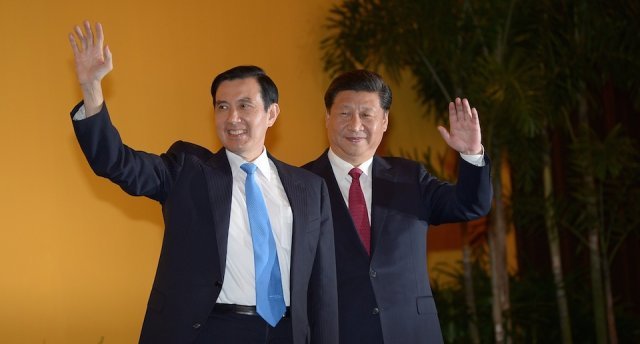Former Taiwanese president Ma Ying-jeou, a member of the pro-China opposition Kuomintang party, is the first former or incumbent Taiwanese president to visit China. Taiwanese President Tsai Ing-wen (蔡英文), a member of the ruling Democratic Progressive Party, is said to be likely to visit the United States this month to meet with the Speaker of the House. Amid heightened military tensions between the US and China over the Taiwan Strait, there are prospects that the Taiwanese presidential election in January next year could take the form of a proxy war between the two countries.
 Ma Ying-jeou, former Taiwanese president. AP Newsis
Ma Ying-jeou, former Taiwanese president. AP NewsisAccording to foreign media including Reuters on the 19th (local time), former President Ma Ying-jeou will visit China for nine days starting on the 27th. According to data released by former President Ma on the same day, during his visit to China, he will meet students and visit places related to Chinese history, such as World War II, the Sino-Japanese War, and the Xinhai Revolution. Since Chiang Kai-shek, Taiwan’s first president, was defeated by the Chinese Communist Party in the Chinese Civil War in 1949, no former or incumbent Taiwanese president has visited China.
The announcement of former President Ma’s visit to China came at a delicate time when prospects were raised that the Chinese Communist Party could intervene in next year’s presidential election. The previous day, the Taipei Times reported that Taiwan’s National Security Council (NSC) secretary-general Kuri-xiong warned in a seminar that the Chinese Communist Party has increased its psychological warfare against Taiwan in recent years and intends to intervene in next year’s election. Reuters reported, “(Former President Ma’s visit to China) took place at a time when tensions between the two countries were rising as China exerted military and political pressure on Taiwan to accept the ‘one China’ principle.”
The Kuomintang prefers a closer relationship with China than the Democratic Progressive Party, which tends to be more independent. Between 2008 and 2016, when former President Ma was in office, the mood for cross-strait reconciliation reached its peak. He even had a summit meeting with Chinese President Xi Jinping in Singapore in 2015.
The Democratic Progressive Party and the Presidential Office expressed their discomfort during their visit to Majeon Chong-dong. “According to the relevant regulations, if he wants to go to China, he must report to the Ministry of the Interior. He said he has not yet received a related report.” The Democratic Progressive Party criticized Ma Ying-jeou for not being able to represent the position of the 23 million Taiwanese people.
It is known that President Tsai Ing-wen plans to leave the country at the end of this month for a visit to the United States.
According to Taiwanese media, including the Free Times, President Tsai is scheduled to stop by New York in the U.S. during a visit to two Central American allies, Guatemala and Belize, and visit California on her return home. It is following the sad tradition of “transit diplomacy” in which it does not go directly to the United States out of concern for China and passes through Central and South American countries.
However, Taiwanese media reported that there is a possibility of meeting with US House Speaker Kevin McCarthy, third in power in the US, at the Reagan Library in Southern California, where President Tsai will give a speech at the invitation of the US “Ronald Reagan Foundation”. There are also observations that if President Tsai and Chairman McCarthy meet, China may strongly oppose and pose a military threat, as happened when House Speaker Nancy Pelosi visited Taiwan in August last year.
The Democratic Progressive Party government, which aims for Taiwan independence, is sticking to the attitude that it must strengthen cooperation with the United States to counter the Chinese threat. “President Tsai’s transit through the United States was planned from the beginning,” said Luo Zhizheng, a member of the Democratic Progressive Party’s legislative body.
The competition between the Democratic Progressive Party and the Nationalist Party is also intensifying in the presidential election next year, which is going to be a proxy war between the U.S. and China. The Democratic Progressive Party is highly likely to nominate Vice President and Party Chairman Lai Qingde as its candidate instead of President Tsai, who is unable to run for three consecutive terms. The Democratic Progressive Party plans to finalize its presidential candidate on the 12th of next month.
In the Kuomintang, Chairman Zhu Lirun, who led the local election victory in November last year, Houyoui, a former police officer, mayor of New Taipei City, and Foxconn founder Guo Timing are considered candidates. Mayor Chang Wan-an, the great-grandson of the first president of Chiang Kai-shek, who was elected mayor of eBay, is also considered a dark horse.
Beijing =
Source: Donga
Mark Jones is a world traveler and journalist for News Rebeat. With a curious mind and a love of adventure, Mark brings a unique perspective to the latest global events and provides in-depth and thought-provoking coverage of the world at large.